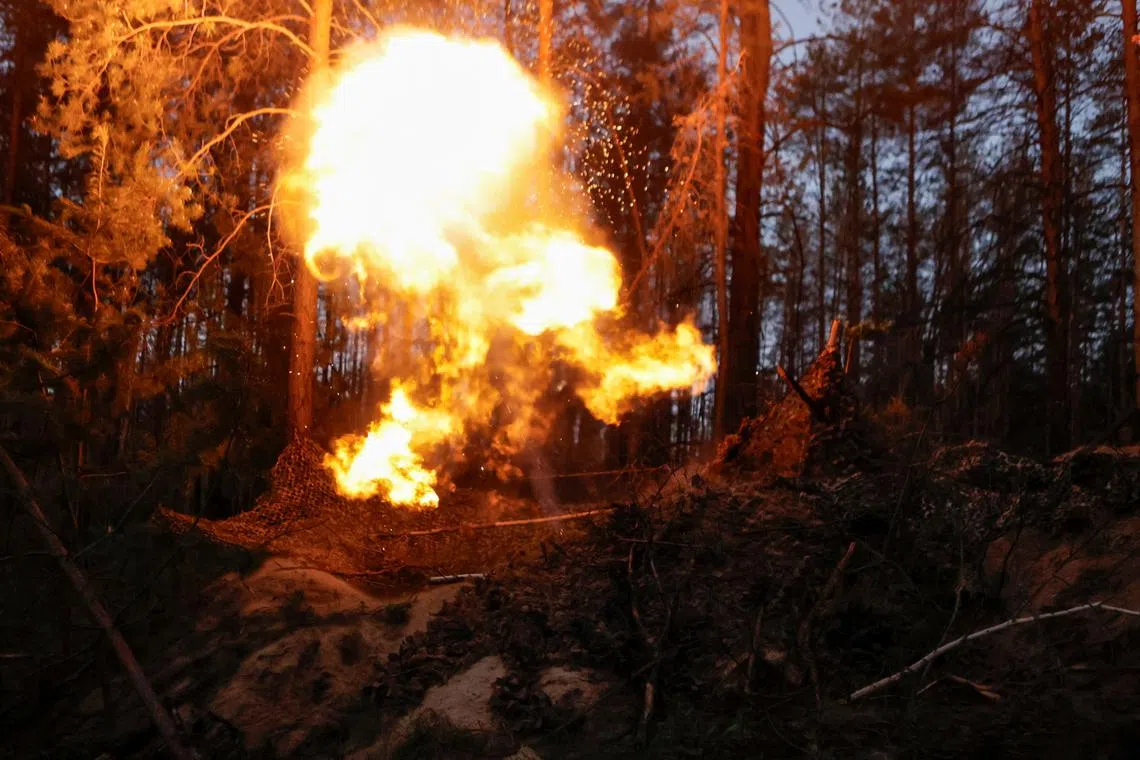EU, Britain go ahead with new Russia sanctions without waiting for Trump
Sign up now: Get ST's newsletters delivered to your inbox

Ukrainian armed forces firing a mortar towards Russian troops in Ukraine in May. Kyiv said it was ready for an immediate ceasefire.
PHOTO: REUTERS
BRUSSELS/LONDON – The European Union (EU) and Britain announced new sanctions against Russia on May 20 without waiting for the United States to join them, a day after US President Donald Trump spoke to Russian President Vladimir Putin without winning a promise for a ceasefire in Ukraine.
London and Brussels said their new measures would zero in on Moscow’s “shadow fleet” of oil tankers and financial companies that have helped it avoid the impact of other sanctions imposed over the war.
Ukraine’s President Volodymyr Zelensky wrote on Telegram: “Sanctions matter, and I am grateful to everyone who makes them more tangible for the perpetrators of the war.”
But the new measures were announced without corresponding steps from Washington, despite intense public lobbying from leaders of European countries for the Trump administration to join them.
German Foreign Minister Johann Wadephul said on the sidelines of a meeting with his EU counterparts in Brussels: “We have repeatedly made it clear that we expect one thing from Russia – an immediate ceasefire without preconditions.”
As Russia had not accepted a ceasefire, “we will have to react”, he said.
“We also expect our US allies not to tolerate this.”
Russia and Ukraine held their first direct talks in more than three years on May 16 at Mr Trump’s behest, but failed to agree on a truce after Moscow presented conditions that a member of the Ukrainian delegation called “non-starters”.
Ukraine said it was ready for an immediate ceasefire proposed by Mr Trump, while Russia said it wanted talks first.
The Europeans said this was proof that Mr Putin, who started the war by invading his neighbour in 2022,
Germany’s Defence Minister Boris Pistorius said: “Putin is clearly playing for time, unfortunately we have to say Putin is not really interested in peace.”
‘Ball in Kyiv’s court’
Reacting to the new sanctions, Russian Foreign Ministry spokeswoman Maria Zakharova told reporters that Russia would never bow to what she called ultimatums.
Mr Putin, after his call with Mr Trump, said that Moscow was ready to work with Ukraine on a memorandum about a future peace accord.
Ms Zakharova said: “Now, accordingly, the ball is in Kyiv’s court.”
Europeans have been working hard in public to persuade the Trump administration to join them in imposing sanctions.
The leaders of Britain, France, Germany and Poland jointly travelled to Kyiv earlier in May and were filmed speaking to Mr Trump on speakerphone with Mr Zelensky.
Several European leaders phoned Mr Trump again on the eve of his call with Mr Putin on May 19, urging him to join them in imposing new sanctions if Russia rejected a ceasefire.
Brussels and London both suggested that more sanctions could still follow, making clear they have not given up hope of persuading Washington to act.
France’s Foreign Minister Jean-Noel Barrot said: “Let us push Vladimir Putin to put an end to his imperialist fantasy.”
Britain’s Foreign Minister David Lammy said “delaying peace efforts will only redouble our resolve to help Ukraine to defend itself and use our sanctions to restrict Putin’s war machine”.
EU foreign policy chief Kaja Kallas said more sanctions were “in the works”.
But she made clear that action was needed from the United States.
“We all agreed and said... that if they don’t agree to unconditional ceasefire, like Ukraine has agreed over 60 days ago, there will be strong action,” Ms Kallas said. “And that is what we want to see from all the parties who have said that they will act in accordance.”
The latest sanctions are aimed mainly at cracking down on a shipping fleet that Russia uses to export oil, circumventing a US$60 a barrel price cap imposed by the Group of Seven industrialised countries to limit Russia’s income.
Britain and the EU said they would also work to lower the cap, which imposes far less of a discount on Russian oil now that global prices have fallen in 2025.
Mr Trump said on May 19 that Russia and Ukraine were ready to start negotiations. Mr Putin said the process would take time. REUTERS


